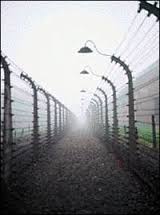

The Survivor
András Mezei
(1930-2008) was a major
Jewish-Hungarian poet. He survived the Holocaust as a child in
the Budapest Ghetto where some 17,000 souls perished around him
from hunger, disease and the fancy of uniformed bandits. He
became a dominant force in the national reconstruction that
followed the collapse of Soviet administration in Eastern Europe
a quarter century ago.
I.
Hanged: A Sketch
He held a fiddle in his left,
a goose brought down, its long limp neck
hung black in death – and to this day
I sense its silenced vocal cords.
What he was not allowed to say
what we can never comprehend
is played out by a hoary bow
upon the slackened silver strings
drawn by the Angel of Good Death
in flight above the snowbound fields:
blue frost upon his grizzled beard
and bunkers and Arbeit macht frei...
And still that violin plays on.
Its melody will never cease.
I see a bald, a silver skull.
I bless my father’s silver bones.
II.
My Father: A Legend
That very death
that very corpse
defines the district
like a plumb-rule
in true suspended
perpendicular.
That measuring-cord
of all of life,
its snowbound plane
and stark protrusions,
projects all human
suffering through
a line across
eternity.
This line so straight –
like weighted down rope
or stretched out cord
or lifting smoke,
a yearning darkened
silver line
through which the body
may rise to reach
its incarnation.
And as a single
beam of light
remains to hold
the tilted head,
the dazzling ray
refines itself
and gains in sharp
intensity.
The beam describes
the path for this
spectacular
one-way procession
of fateful signals:
thus the body
must meekly follow
the faithful breath.
The tightening throat –
the rattling cry –
the fleeing breath –
they liberate
the bursting soul
to rip its road
of focused light
towards the stars,
and cleave apart
our firmament
of deathly darkness,
and find a rest
upon the columns
of air supported
by the Children
of the Light.
The jawbone points
towards the sky –
the shoulder bone
has lost the fiddle –
Above the earth,
beneath the sky
abandoned hangs
a broken corpse
that would not soar
above the hill
of scaffolds, nor would
sink below,
and occupies
the light as though
it were supported
by the soul.
The joints are loosened.
Every bone
acquires its own
and separate weight.
The neck, the limbs
grow elongated.
Like the stars,
the vertebrae
inevitably
pull asunder.
The sagging burden
of the arms
weighs down the shoulders.
The heavy wooden
prison clogs
hung from the feet
extend the ankles,
stretch the knees,
reshape the body.
Death is accomplished.
At last, the final
script of symbols:
The opened mouth,
the hanging tongue
blue like a flower
on a winter twig.
The busy stripes
of the prison garment
come to rest.
Beneath the sky
before the heaven
the flesh, the bones,
the prison rags
disintegrate
and, effortlessly,
the corpse dissolves
within the picture.
Over the desolate
wire fence,
above the fiddler
glows a gentle
protective hand.
Five shafts of light
direct my gaze
towards the City.
And... Here I am.*
III.
Love in Auschwitz
Birdsong, dusk. Departure from Auschwitz.
Resurgent love steps out from the gates,
immortal love whose skeletal essence
could never be consumed by the flames.
Past soaring hopes, reality
slowly settles from the smoke:
the heat of incandescent mess-tins –
a dented spoon beneath the earth –
and like that mouth, that Gothic cavity
that spewed them, gods and fantasies
decompose amidst the dental
gold extracted from the dead.
The gas decays. The bunkers crumble.
The deportation trains withdraw.
And – Here I am, and here the arms
to hold the living world in... love.
For love redeems the fence of death:
I share your being and you mine
together in the light and silence
beneath our gagged and distant stars.
==========================================================
*The Bible/Isaiah 6:8 – “Then I heard the voice of the Lord
saying, Whom shall I send?... And I said, Here am I. Send me!”
András Mezei
Translated from the
Hungarian & Edited by Thomas Land
If you have any thoughts on this poem, Thomas Land would be
pleased to hear them.


